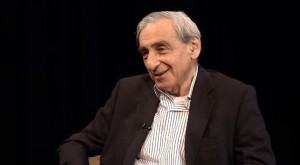Fathom has invited a series of writers to respond to Chaim Gans’s A Political Theory for the Jewish People (Oxford University Press, 2016). An interview with Gans appeared in our Winter 2016 issue. In April, we will publish an appreciative but critical review by Nahshon Perez of Bar Ilan University. Here, the US political theorist and public intellectual Michael Walzer responds to what Gans writes about diaspora Jews. We invite other responses to the book from our readers.
We should take Chaim Gans’s title very seriously. The book was written, first of all, for Israeli Jews, and it was published first in Hebrew. But it is addressed to ‘the Jewish people’ in Israel and abroad, and this is one of its most striking features. Zionist writers in the past have had something to say to diaspora Jews. Their message was very simple: if you want a Jewish life, you must make aliyah. Pack up and come … now. Gans provides us with a much more extended and nuanced discussion, and it’s that part of his book that I want to consider here.
His discussion begins with the standard view of Zionism’s goal, which he actually shares with his chief adversary, the ‘proprietary Zionists’: the ‘negation of the exile.’ [For Gans’s own definitions of ‘proprietary,’ ‘hierarchical’ and ‘egalitarian’ Zionism see his interview in Fathom.] ‘Negation’ was the goal of pretty much every Zionist writer and activist – even of those who did not think that all Jews would, or should, move to the land of Israel. Negation was a critical stance, directed at the exilic way of life – the ‘way’ as much as the geographic location. In Zionist eyes, exilic Jews were fearful, passive, disorganised, incapable of self-defence, and endlessly superstitious – or they were stooped and scholarly, engrossed in old texts, alienated from nature. Ahad Ha-am’s description draws from these pictures and adds his own perception of the new secular intelligentsia: he was appalled by ‘the lack of unity and order … the lack of [common] sense and social cohesion … the narcissism that holds such terrible sway over the prominent members of the people … the thrill of showing off and the arrogance … the tendency always to be too clever’. Zionism was supposed to make for a more ‘normal’ existence and a healthier culture even in the old country, before aliyah.
So there is a double sense in which the exile is now, in fact, ‘negated’. First, as Gans says, once a Jewish state exists and every Jew in the world can go there, the exile is over – even if, unexpectedly, the diaspora isn’t. But the exile has been negated in another sense, not only by the creation of Israel but also by democratic citizenship in countries like the US. The old stereotypes of the exilic Jew no longer describe us; the mentality of exile is a thing of the past. I don’t mean that we are done with narcissism and arrogance, but we have no more than our share of those two, and all the other pathologies of exile now make only normal appearances among us. We are much more like everyone else, which was one of the goals of Zionism. READ MORE
Also in Fathom 16 Chaim Gans responds to Michael Walzer. Read his rejoinder HERE.



